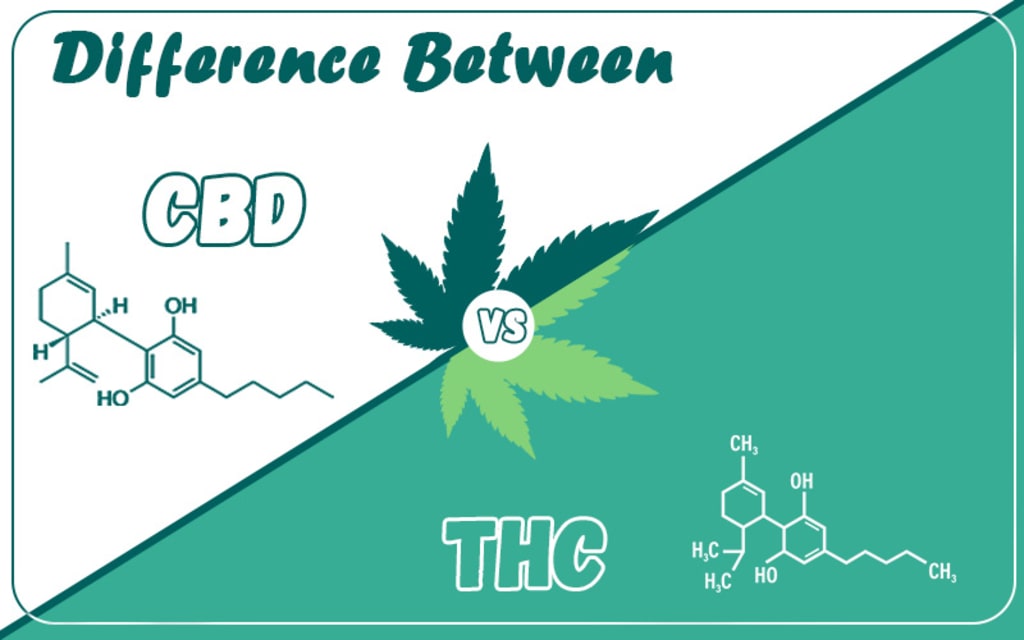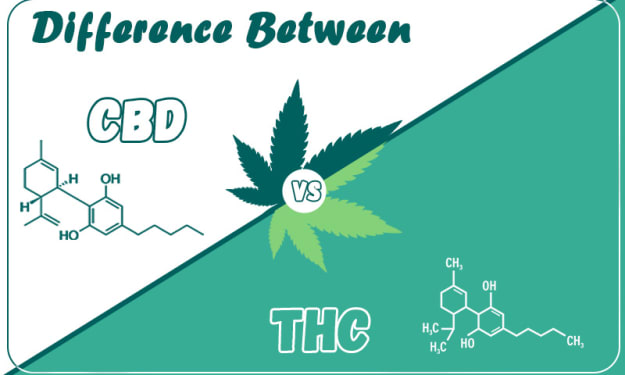What is the difference between CBD and THC ?
CBD (cannabidiol) and THC (tetrahydrocannabinol) are two compounds found in cannabis plants, but they have distinct characteristics and effects. While both interact with the body's endocannabinoid system, their impact is quite different.

CBD (cannabidiol) and THC (tetrahydrocannabinol) are both compounds found in cannabis plants, but they have distinct properties and effects on the body. Here are the main differences between CBD and THC:
Chemical Structure: CBD and THC have the same molecular formula (21 carbon atoms, 30 hydrogen atoms, and 2 oxygen atoms), but their atoms are arranged differently, resulting in distinct chemical structures.
Psychoactive Effects: THC is psychoactive, meaning it produces the "high" or intoxicating effect commonly associated with cannabis use. CBD, on the other hand, is non-psychoactive and does not produce a high.
Legal Status: The legal status of CBD and THC can vary depending on the jurisdiction. In many parts of the world, CBD extracted from industrial hemp containing less than 0.3% THC is legal, while THC is restricted to medicinal or recreational use in specific circumstances.
Medical Applications: Both CBD and THC have potential medical applications, but they are used for different purposes. THC is primarily used for its analgesic (pain-relieving), anti-nausea, and appetite-stimulating properties. CBD is known for its anti-inflammatory, anti-anxiety, and potential neuroprotective effects. It is commonly used in products intended to promote relaxation, reduce anxiety, and relieve pain.
Side Effects: THC can cause side effects such as short-term memory impairment, coordination problems, dry mouth, red eyes, and an increased heart rate. CBD is generally well-tolerated, and significant side effects are rare. However, it may cause mild effects like dry mouth, drowsiness, and changes in appetite.
Drug Testing: THC can be detected in drug tests, so its use can result in a positive test. CBD, if sourced from hemp with low THC content, is unlikely to trigger a positive drug test. However, some CBD products may contain trace amounts of THC, which could potentially show up in a drug test.
Mode of Action: Both CBD and THC interact with the body's endocannabinoid system (ECS), but they have different effects. THC binds to cannabinoid receptors (mainly CB1 receptors) in the brain and nervous system, leading to its psychoactive effects. CBD does not directly bind to these receptors but influences the ECS in more complex ways, potentially modulating the effects of other cannabinoids.
It's important to note that the effects of CBD and THC can vary depending on the dosage, the individual's tolerance, and the specific product or strain used. If you have any specific medical concerns or questions about CBD or THC, it is advisable to consult a healthcare professional.
Effects of THC vs. CDB
Understanding the crucial distinction won't help you understand how it might influence you. Here are the differences between CBD and THC's effects.
1. Pharmaceutical effects:
CBD can bind to the protein GPR55, which is frequently recognized to cause physical seizures. It also relieves neuropathic pain and functions as an antidepressant. Additionally, CBD has been shown to help with anxiety symptoms.
THC helps with inflammation-related discomfort and nausea. THC is also advantageous and effectively relieves chronic pain.
2. Use for leisure
Even though CBD may provide you with potential alleviation, relaxation, and reduced anxiety, it has no intoxicating or recreational effects. On the other hand, THC is employed for leisure activities.
- Hallucinations
- Modifications in mood
- Having trouble moving
- Thinking difficulty.
Effects of THC and CBD
Every chemical has advantages and disadvantages, and CBD and THC are no exception.
Side Effects of CBD
- Sluggishness
- Sleepiness
- Diarrhoea and significant mood swings
THC Negative Effects
- Modifications to the blood pressure and heart rate
- Risk of mood disorders
- Discomfort in the lungs
Different CBD and THC types can benefit you in different ways
Varieties of CBD
Wide spectrum Cannabinoids but no THC are present in this CBD. Terpenes and cannabinol are present.
Whole plant CBD contains cannabinol, oils, terpenes, and all other plant chemicals found in hemp.
Full spectrum CBD contains not only the primary ingredients of terpenes, flavonoids, etc. but also the active compounds present in the cannabis plant.
Pure CBD: As the name implies, this product only contains the CBD ingredient.
Kinds of THC
The high you get after using the chemical is actually caused by this Delta 9 THC. Additionally, it aids in boosting appetite.
Less than 1% of the marijuana plant has the isomer of delta 9 THC known as delta 8 THC.
THCP - This one outperforms the delta nine and is over 33% stronger.
When consumed in large dosages, THCV is quite effective; however, smaller doses have little effect.
Conclusion
Despite being parts of the same plant, CBD and THC each have unique characteristics. THC can provide a high and promote relaxation. CBD, on the other hand, has no euphoric or psychotropic effects.
THC is the substance to use if you want the effect, but you need consider what you desire and which will benefit you more.
To know more , kindly visit this link . Explore Now !!





Comments
There are no comments for this story
Be the first to respond and start the conversation.